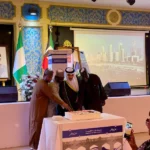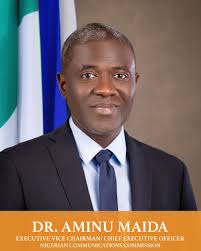By Jessica Dogo
The Nigerian Communications Commission (NCC) has unveiled its General Authorisation Framework (GAF) to enhance growth in the industry and empower underserved communities.
The commission did the unveiling during a stakeholder engagement for the Nigerian Telecoms Industry on Thursday in Abuja.
The News Agency of Nigeria (NAN) reports that the event brought together key players from the telecommunications sector to discuss the future of digital innovation in Nigeria.
The Executive Vice-Chairman (EVC) of NCC, Dr Aminu Maida, said that the sector had become a symbol of innovation and progress, revolutionising communication, improving access to information, and reshaping business operations.
Maida, represented by the Executive Commissioner, Stakeholder Management, Rimini Makama, highlighted the tremendous progress made in the telecommunications sector over the past 24 years.
He said that the sector was at a turning point, where disruptive innovations were accelerating the evolution of the communications ecosystem.
“This progress has been driven by the rapid uptake of mobile technologies, surging data consumption and an increasing appetite for digital services.
“We are now at a turning point where the nature of innovation demands a regulatory paradigm that is not only responsive but enabling.
“Broadband Penetration continues to grow, while digital literacy is on the rise,” he said.
According to him, these are creating a solid foundation for a vibrant digital economy driven by accessibility, innovation and inclusivity.
Maida said that technological innovation was accelerating across the world, and across the nation.
He emphasised the need for a regulatory paradigm that was not only responsive but enabling.
He said that it would allow innovators to experiment without unnecessary restrictions, adding that the framework is introduced as a key initiative to achieve this goal.
“The framework has introduced three key instruments that would provide a platform for innovators to test and validate their ideas, assess risk, and measure outcomes before deployment.
“The success of the framework depends on the active participation of stakeholders, including mobile network operators, service providers, infrastructure companies, OEMs, startups, civil society and academia,” he said.
The EVC said that the framework aimed to promote inclusive innovation, expanding access, closing connectivity gaps and empowering underserved communities.
“This is an objective that lies at the core of the NCC’s latest initiative, the General Authorisation Framework.
“By adopting this approach, we are providing a platform for innovators of various sizes, whether they are startups or established companies, to demonstrate feasibility, assess risk, and measure outcomes before deployment.
“This model encourages experimentation and responsible innovation while safeguarding consumer rights and public interest,” he said.
Maida expressed optimism that the stakeholder engagement would spark curiosity, refine the collective vision and accelerate the journey towards a more connected, innovative and prosperous Nigeria.
He called for collaboration and partnership to refine the approach and ensure that it worked for Nigeria.
He said that the future of Nigeria’s digital economy was unfolding rapidly, with the communications sector at the heart of this future.
Earlier, NCC’s Director, Licensing and Authorisation Department, Mr Usman Mamman, said that GAF was the outcome of extensive research, cross-departmental collaboration and evaluation of global best practices, and local industry dynamics.
Mamman described it as a flexible and forward-looking approach to licensing that promotes innovation while ensuring regulatory oversight, consumer protection and market integrity.
According to him, the NCC conducted an internal review of recent service applications and pilot proposals, revealing a growing need for a flexible pathway to test new and emerging ideas.
He said that a benchmark study was also carried out to learn from other countries, including the UK’s Ofcom Sandbox model and Singapore’s Infocomm Media Development Authority (MDA) testbeds.
“This shows a growing need for a flexible and well-structured pathway to test new and emerging ideas,” he said.
He called on stakeholders to ensure that the framework becomes a solid bridge between innovation and regulation, between start-up visionaries and established players, and between present limitations and future possibilities. (NAN)(www.nannews.ng)
Edited by Kadiri Abdulrahman












